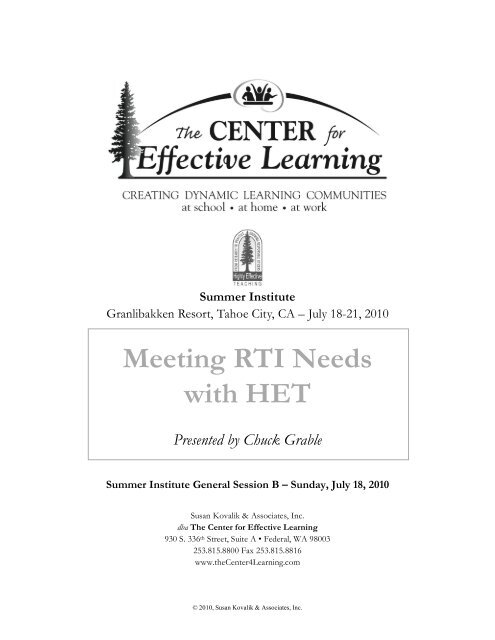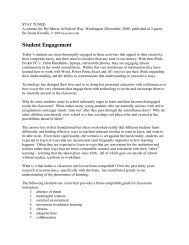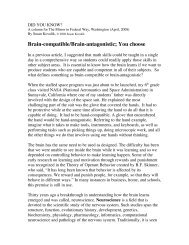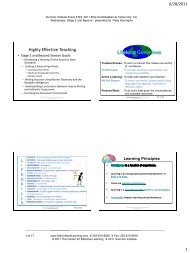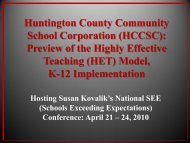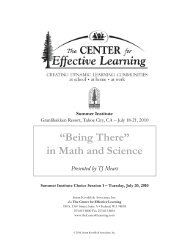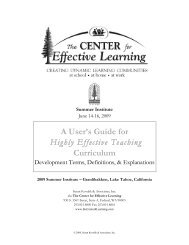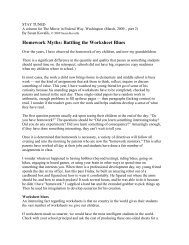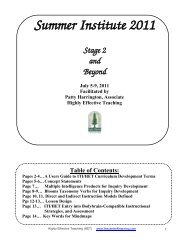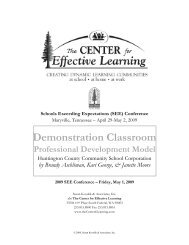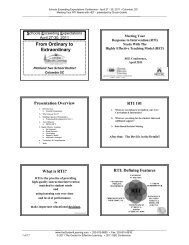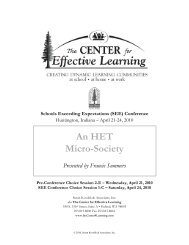Meeting RTI Needs with HET - Susan Kovalik & Associates
Meeting RTI Needs with HET - Susan Kovalik & Associates
Meeting RTI Needs with HET - Susan Kovalik & Associates
Create successful ePaper yourself
Turn your PDF publications into a flip-book with our unique Google optimized e-Paper software.
Summer Institute<br />
Granlibakken Resort, Tahoe City, CA – July 18-21, 2010<br />
<strong>Meeting</strong> <strong>RTI</strong> <strong>Needs</strong><br />
<strong>with</strong> <strong>HET</strong><br />
Presented by Chuck Grable<br />
Summer Institute General Session B – Sunday, July 18, 2010<br />
<strong>Susan</strong> <strong>Kovalik</strong> & <strong>Associates</strong>, Inc.<br />
dba The Center for Effective Learning<br />
930 S. 336 th Street, Suite A • Federal, WA 98003<br />
253.815.8800 Fax 253.815.8816<br />
www.theCenter4Learning.com<br />
© 2010, <strong>Susan</strong> <strong>Kovalik</strong> & <strong>Associates</strong>, Inc.
Summer Institute - July 18 - 21, 2010 • Granlibakken, Tahoe City, CA<br />
<strong>Meeting</strong> <strong>RTI</strong> <strong>Needs</strong> <strong>with</strong> <strong>HET</strong> - presented by Chuck Grable<br />
_________________________________________________________________________________________________________<br />
Presentation Overview<br />
<strong>Meeting</strong> Your<br />
Response to Intervention (<strong>RTI</strong>)<br />
<strong>Needs</strong> With The<br />
Highly Effective Teaching Model (<strong>HET</strong>)<br />
Summer Institute<br />
July 2010<br />
1. <strong>RTI</strong> Overview<br />
! Essential Components<br />
2. Why Focus on Tier 1?<br />
3. Building Capacity of Stakeholders<br />
! Professional Development for Tier 1<br />
4. Tier 1 Behavior<br />
! PBIS & <strong>HET</strong><br />
5. Highly Effective Teaching<br />
! Environment<br />
! Brain Research<br />
! Curriculum<br />
! Daggett’s Model<br />
! Marzano’s Strategies<br />
6. Vocabulary & Comprehension<br />
7. Math<br />
<strong>RTI</strong> 101<br />
Why <strong>RTI</strong>?<br />
1. What are you doing to strengthen your Core<br />
Curriculum & Instruction?<br />
2. What are you doing for the students that need<br />
additional support?<br />
3. Data-Based Decision Making<br />
After that: The Devil is in the Details!!<br />
IDEA Partnership<br />
Why <strong>RTI</strong>?<br />
! 80% of children identified as Specific Learning Disabeled<br />
(SLD), really just have reading problems because the right<br />
strategies were not used <strong>with</strong> them during reading instruction<br />
! Poor readers at end of 1 st grade almost never acquire grade<br />
level reading<br />
! If not reading on grade level by 3 rd grade, odds of ever<br />
reading on grade level are 1 in 17<br />
! In 4 th grade, need 2 hours of instructional time to make same<br />
gains as make in 30 minutes of instructional time in<br />
kindergarten.<br />
! Use of discrepancy approach for SLD identification results in<br />
“wait to fail”<br />
! Not identified until 3 rd grade or later.<br />
What is <strong>RTI</strong>?<br />
<strong>RTI</strong> is the practice of providing<br />
high-quality instruction/intervention<br />
matched to student needs<br />
and<br />
using learning rate over time<br />
and level of performance<br />
to<br />
make important educational decisions.<br />
IDEA Partnership<br />
<strong>RTI</strong> Action Network<br />
____________________________ __________________________________________________________________________________<br />
www.theCenter4Learning.com • 253-815-8800 • Fax: 253-815-8816<br />
1 of 18<br />
© 2010 <strong>Susan</strong> <strong>Kovalik</strong> & <strong>Associates</strong>, Inc. • 2010 Summer Institute
Summer Institute - July 18 - 21, 2010 • Granlibakken, Tahoe City, CA<br />
<strong>Meeting</strong> <strong>RTI</strong> <strong>Needs</strong> <strong>with</strong> <strong>HET</strong> - presented by Chuck Grable<br />
_________________________________________________________________________________________________________<br />
<strong>RTI</strong>: Defining Features<br />
<strong>RTI</strong> Core Principles<br />
! We can effectively teach all children<br />
<strong>RTI</strong><br />
! Intervene early<br />
! Use a multi-tier model of service delivery<br />
! Use a problem-solving methodology<br />
<strong>RTI</strong> Core Principles (continued)<br />
! Use research-based, scientifically validated<br />
interventions/instruction<br />
! Monitor student progress to inform instruction<br />
! Use data to make decisions<br />
! Use assessments for three different purposes:<br />
! Screening<br />
! Diagnostics<br />
! Progress monitoring<br />
Fundamental Assumptions<br />
!All the students are all our responsibility<br />
!All students can make progress when given the<br />
amount and kind of support needed<br />
!Teaching to the middle doesn’t meet all students<br />
needs.<br />
!Therefore, we must use our resources in new,<br />
different, and collaborative ways to ensure each<br />
student is as successful as possible!<br />
<strong>RTI</strong> Action Network<br />
Essential Component 1: Multi-tier Model<br />
Significantly Low<br />
Underachievement<br />
Tier 3: INTENSIVE<br />
Interventions & Progress<br />
Monitoring<br />
Tier 2:<br />
TARGETED Interventions<br />
and Progress Monitoring<br />
Insufficient Response<br />
to Intervention<br />
Academic<br />
Behavior<br />
Tier 1:<br />
CORE Curriculum & Instruction; Universal Supports;<br />
Universal Screening & Progress Monitoring; and<br />
Instructional and Behavioral Interventions<br />
(Differentiation), PBIS<br />
IDEA Partnership<br />
IDEA Partnership<br />
____________________________ __________________________________________________________________________________<br />
www.theCenter4Learning.com • 253-815-8800 • Fax: 253-815-8816<br />
2 of 18<br />
© 2010 <strong>Susan</strong> <strong>Kovalik</strong> & <strong>Associates</strong>, Inc. • 2010 Summer Institute
Summer Institute - July 18 - 21, 2010 • Granlibakken, Tahoe City, CA<br />
<strong>Meeting</strong> <strong>RTI</strong> <strong>Needs</strong> <strong>with</strong> <strong>HET</strong> - presented by Chuck Grable<br />
_________________________________________________________________________________________________________<br />
Tier 1<br />
""""""Essential Component 2:<br />
Problem-Solving Method<br />
“Powerful classroom instruction begins <strong>with</strong><br />
the adoption and use of an evidence-based<br />
curriculum, but effective teachers do not<br />
simply teach such a program page-by-page<br />
in the same way for all students. Rather,<br />
they differentiate instruction, providing<br />
instruction designed to meet the specific<br />
needs of students in the class.”<br />
Did it<br />
work?<br />
What is the problem?<br />
Why is it<br />
happening?<br />
<strong>RTI</strong> Action Network<br />
What should be done about it?<br />
IDEA Partnership<br />
GEI Transforms to <strong>RTI</strong><br />
GEI<br />
• Viewed as a gateway to<br />
special education<br />
• Used to accommodate<br />
& create access to the<br />
curriculum<br />
• Little focus on progress<br />
monitoring or data<br />
collection<br />
• No longer in IDEA or<br />
Article 7<br />
• Little focus on fidelity<br />
• Often more than 1<br />
strategy implemented<br />
at one time<br />
• Student focused<br />
• Achievement<br />
focused<br />
• Utilizes problem<br />
solving process<br />
<strong>RTI</strong><br />
• About ALL students’<br />
response to interventions<br />
• Focus on systematic data<br />
collection & analysis<br />
• Emphasis on systematic<br />
universal screening &<br />
progress monitoring<br />
• Instructional decisions<br />
based on progress<br />
monitoring data<br />
• Focus on fidelity<br />
• Implement 1<br />
intervention at a<br />
time<br />
Standard Treatment Protocol Hybrid: Academics<br />
Tier Grade K-2 Grades 3-5<br />
Tier 1 Core curriculum and instruction provided to all students Core curriculum and instruction provided to all students<br />
<strong>with</strong>:<br />
<strong>with</strong>:<br />
•Research or evidence based instructional strategies •Research or evidence based instructional strategies<br />
•Differentiation<br />
•Differentiation<br />
•Embedded interventions<br />
•Embedded interventions<br />
•Common accommodations<br />
•Common accommodations<br />
Tier 2 Targeted interventions for some low-responding students: Targeted interventions for some low-responding students:<br />
•Additional Guided Reading Groups<br />
•Additional Guided Reading Groups<br />
•Targeted/strategic differentiation<br />
•Targeted/strategic differentiation<br />
•Small flexible skill groups<br />
•Small flexible skill groups<br />
•Before or after school remediation<br />
•Before or after school remediation<br />
•Student Success Time/SSP<br />
•Student Success Time/SSP<br />
•Success Maker reading or math<br />
•Success Maker reading or math<br />
•Sheltered Lessons (ELL)<br />
•Sheltered Lessons (ELL)<br />
Tier 3 Intensive interventions for individual low-responding Intensive interventions for individual low-responding<br />
students:<br />
students:<br />
•Leveled Literacy Intervention (L.L.I.)<br />
•Leveled Literacy Intervention (L.L.I.)<br />
•Success Maker reading or math<br />
•Success Maker reading or math<br />
•Wilson Reading<br />
•Wilson Reading<br />
•Ortin Gillingham<br />
•Ortin Gillingham<br />
•Lindamood-Bell<br />
•Lindamood-Bell<br />
•Morgan Phonics<br />
•Morgan Phonics<br />
•Tucker Reading<br />
•Tucker Reading<br />
•Rosetta Stone (ELL)<br />
•Rosetta Stone (ELL)<br />
Standard Treatment Protocol Hybrid: Academics<br />
Tier Grade 6-8 Grades 9-12<br />
Tier 1 Core curriculum and instruction provided to all students Core curriculum and instruction provided to all students<br />
<strong>with</strong>:<br />
<strong>with</strong>:<br />
•Research or evidence based instructional strategies •Research or evidence based instructional strategies<br />
•Differentiation<br />
•Differentiation<br />
•Embedded interventions<br />
•Embedded interventions<br />
•Common accommodations<br />
•Common accommodations<br />
Tier 2 Targeted interventions for some low-responding students: Targeted interventions for some low-responding students:<br />
•Additional Guided Reading Groups<br />
•Targeted/strategic differentiation<br />
•Targeted/strategic differentiation<br />
•Small flexible skill groups<br />
•Small flexible skill groups<br />
•Developmental Reading Course<br />
•Before or after school remediation<br />
•Reading Comprehension Course<br />
•Student Success Time/SSP<br />
•Language Arts & Math Lab Classes<br />
•Success Maker reading or math<br />
•Before or after school remediation<br />
•Sheltered Lessons (ELL)<br />
•Remediation during homeroom/SRT<br />
•Wilson Reading<br />
•NovaNet<br />
•Sheltered Lessons (ELL)<br />
Tier 3 Intensive interventions for individual low-responding Intensive interventions for individual low-responding<br />
students:<br />
students:<br />
•System 44<br />
•System 44<br />
•READ 180<br />
•READ 180<br />
•Success Maker reading or math<br />
•NovaNet<br />
•Wilson Reading<br />
•Success Maker reading or math<br />
•Ortin Gillingham<br />
•Wilson Reading<br />
•Lindamood-Bell<br />
•Ortin Gillingham<br />
•Tucker Reading<br />
•Lindamood-Bell<br />
•Rosetta Stone (ELL)<br />
•Tucker Reading<br />
•Rosetta Stone (ELL)<br />
Essential Component 3: Integrated Instructional<br />
Data Collection/Assessment Systems<br />
! Assessment of<br />
" Skills in state<br />
standards<br />
" “Marker variables”<br />
(benchmarks)<br />
leading to ultimate<br />
instructional target<br />
! To be administered<br />
" Efficiently<br />
" Repeatedly<br />
! Provide<br />
" Data specific to strategy<br />
implemented<br />
IDEA Partnership<br />
" Individual student progress<br />
monitoring data, sensitive<br />
to small increments of<br />
growth<br />
" Comparison data across<br />
students<br />
" User-friendly data displays<br />
____________________________ __________________________________________________________________________________<br />
www.theCenter4Learning.com • 253-815-8800 • Fax: 253-815-8816<br />
3 of 18<br />
© 2010 <strong>Susan</strong> <strong>Kovalik</strong> & <strong>Associates</strong>, Inc. • 2010 Summer Institute
Summer Institute - July 18 - 21, 2010 • Granlibakken, Tahoe City, CA<br />
<strong>Meeting</strong> <strong>RTI</strong> <strong>Needs</strong> <strong>with</strong> <strong>HET</strong> - presented by Chuck Grable<br />
_________________________________________________________________________________________________________<br />
Data-Based Decision Making<br />
“To truly improve achievement,<br />
educators must focus on desired<br />
results, set clear and obtainable goals,<br />
and discuss progress on these goals<br />
throughout the learning process. As<br />
educators discuss progress, they must<br />
use the data to inform, and possibly<br />
change, teaching methods.”<br />
Cara Shores & Kim Chester, 2009<br />
Using <strong>RTI</strong> for School Improvement<br />
Universal Screening<br />
“Schools use universal screenings in essential academic areas to identify<br />
each student’s level of proficiency (usually three times a year). The<br />
screening data are organized in a format that allows for the inspection of<br />
both group and individual performance on specific skills. Teachers meet<br />
in grade-level or department teams to analyze data on all students, set<br />
group goals for the next assessment period, and plan for whole class<br />
instructional change based on the data. Interventions at Tier 1 are<br />
oriented towards whole-group instructional procedures.” (NASDSE)<br />
• Purposes of Universal Screening:<br />
! Assessment of the Core Curriculum & Core Instruction<br />
! Identify those students who need further interventions<br />
at Tier 2<br />
Progress Monitoring<br />
“A scientifically based practice used to assess students’ academic performance and<br />
evaluate the effectiveness of instruction. Progress monitoring can be implemented<br />
<strong>with</strong> individual students or an entire class. Also, the process used to monitor<br />
implementation of specific interventions.” (<strong>RTI</strong> Action Network)<br />
! Short probes that are sensitive to small increments of growth and can<br />
be given efficiently & repeatedly<br />
! Purposes of Progress Monitoring:<br />
! Assessment of the intervention strategy (determine whether to<br />
fade, continue, or change – Rule of 4 by 4)<br />
! Identify those students who need further interventions at Tier 3<br />
Scores<br />
Aim Line<br />
Benchmark or target<br />
score<br />
Starting score Dates of Progress Monitoring Sessions<br />
<strong>RTI</strong> Assessments<br />
! Special education consideration - Must have<br />
assessments in the 8 areas to identify a specific<br />
learning disability:<br />
#$Math computation/calculation<br />
NWEA<br />
%$Math problem solving<br />
&$Written expression Quarterly Writing<br />
'$Oral expression Assessments<br />
HCCSC Standard 7 Rubric<br />
($Listening comprehension<br />
)$Basic reading skills<br />
*$Reading fluency skills DIBELS, RR, & NWEA<br />
+$Reading comprehension<br />
SLD Determination - IDEA<br />
(1) Data that demonstrate that prior to, or as part<br />
of, the referral process, the child was provided<br />
appropriate instruction in regular education settings,<br />
delivered by qualified personnel; and<br />
(2) Data-based documentation of repeated<br />
assessments of achievement at reasonable intervals,<br />
reflecting formal assessments of student progress<br />
during instruction, which was provided to the child’s<br />
parents.<br />
____________________________ __________________________________________________________________________________<br />
www.theCenter4Learning.com • 253-815-8800 • Fax: 253-815-8816<br />
4 of 18<br />
© 2010 <strong>Susan</strong> <strong>Kovalik</strong> & <strong>Associates</strong>, Inc. • 2010 Summer Institute
Summer Institute - July 18 - 21, 2010 • Granlibakken, Tahoe City, CA<br />
<strong>Meeting</strong> <strong>RTI</strong> <strong>Needs</strong> <strong>with</strong> <strong>HET</strong> - presented by Chuck Grable<br />
_________________________________________________________________________________________________________<br />
Why Focus on Tier 1?<br />
Out of every 100 ninth graders….<br />
International Center for Leadership<br />
65 will graduate from high school<br />
International Center for Leadership<br />
39 will enter college<br />
International Center for Leadership<br />
26 are still enrolled in the sophomore year<br />
International Center for Leadership<br />
15 will graduate from college<br />
International Center for Leadership<br />
____________________________ __________________________________________________________________________________<br />
www.theCenter4Learning.com • 253-815-8800 • Fax: 253-815-8816<br />
5 of 18<br />
© 2010 <strong>Susan</strong> <strong>Kovalik</strong> & <strong>Associates</strong>, Inc. • 2010 Summer Institute
Summer Institute - July 18 - 21, 2010 • Granlibakken, Tahoe City, CA<br />
<strong>Meeting</strong> <strong>RTI</strong> <strong>Needs</strong> <strong>with</strong> <strong>HET</strong> - presented by Chuck Grable<br />
_________________________________________________________________________________________________________<br />
Student Survey Percentages<br />
Survey Statement Total Male Female<br />
I enjoy being at school 50.2 47.4 53.2<br />
Teachers make school an exciting<br />
place to learn<br />
33.0 32.9 32.6<br />
School is boring 45.5 49.9 41.5<br />
Teachers have fun at school 38.5 39.8 37.6<br />
Student Survey Percentages<br />
Survey Statement Total Male Female<br />
At school I am encouraged to be<br />
creative<br />
My classes help me understand what<br />
is happening in my everyday life<br />
I learn new things that are interesting<br />
to me at school<br />
58.8 56.4 61.3<br />
39.8 39.3 40.9<br />
66.3 63.8 69.9<br />
Learning can be fun 63.5 59.0 69.3<br />
International Center for Leadership<br />
International Center for Leadership<br />
Student Survey Percentages<br />
Survey Statement Total Male Female<br />
School is a welcoming and friendly<br />
place<br />
62.8 62.9 63.0<br />
Student Survey Percentages<br />
Survey Statement Total Male Female<br />
Students respect teachers 39.1 41.5 36.9<br />
Teachers care about my problems<br />
and feelings<br />
45.6 43.5 48.3<br />
Teachers respect students 54.2 53.8 55.7<br />
I am proud of my school 48.8 47.8 50.8<br />
Students respect each other 29.4 31.8 27.3<br />
International Center for Leadership<br />
International Center for Leadership<br />
Student Survey Percentages<br />
Changing Paradigms<br />
Survey Statement Total Male Female<br />
Teachers care about me as an<br />
individual<br />
Teachers care if I am absent from<br />
school<br />
51.0 50.1 52.7<br />
49.5 47.7 52.1<br />
International Center for Leadership<br />
The 19 th Century<br />
• Information scarce<br />
• Students need to<br />
memorize,<br />
follow instructions<br />
• Learning not related to<br />
other<br />
content areas<br />
• Students work in a<br />
closed<br />
environment<br />
Source: • National New Tech citizenship<br />
Network<br />
The 21 st Century<br />
• Information abundant<br />
• Students learn to create<br />
and<br />
problem-solve<br />
• Content integrated <strong>with</strong><br />
other<br />
subjects, real world<br />
• Students work across<br />
multiple<br />
boundaries<br />
• Global citizenship<br />
____________________________ __________________________________________________________________________________<br />
www.theCenter4Learning.com • 253-815-8800 • Fax: 253-815-8816<br />
6 of 18<br />
© 2010 <strong>Susan</strong> <strong>Kovalik</strong> & <strong>Associates</strong>, Inc. • 2010 Summer Institute
Summer Institute - July 18 - 21, 2010 • Granlibakken, Tahoe City, CA<br />
<strong>Meeting</strong> <strong>RTI</strong> <strong>Needs</strong> <strong>with</strong> <strong>HET</strong> - presented by Chuck Grable<br />
_________________________________________________________________________________________________________<br />
Employer’s Perspective<br />
Wolfram|Alpha:<br />
Making the World's Knowledge Computable<br />
Wolfram|Alpha's long-term goal is to make all systematic<br />
knowledge immediately computable and accessible to<br />
everyone. …to collect and curate all objective data;<br />
implement every known model, method, and algorithm;<br />
and make it possible to compute whatever can be<br />
computed about anything. Our goal is to build on the<br />
achievements of science and other systematizations of<br />
knowledge to provide a single source that can be relied on<br />
by everyone for definitive answers to factual queries.<br />
Are They Really Ready to Work? Employers’ perspectives on the basic knowledge and applied skills<br />
of new entrants to the 21st century U.S. workforce, Partnership for 21 st Century Skills, 2006<br />
#$$%&''( ( ( ) * +( ,-./01 0-%#0+2,1<br />
Source: New Tech Network<br />
38<br />
Key Concept:<br />
Systems Thinking/Alignment<br />
Building Capacity <strong>with</strong> Stakeholders<br />
• School Board:<br />
! Presentations to build understanding of <strong>RTI</strong><br />
! Core Values:<br />
1. Lifelong Guidelines, LIFESKILLS, and a Secure Environment<br />
2. High Expectations, High Achievement, and Accountability<br />
3. Focus On The Future<br />
4. Continuous Improvement For All<br />
5. Responsive Communication<br />
6. Evidence-Based Decisions<br />
7. Shared Leadership<br />
8. Stakeholder Focus<br />
! Mission<br />
! Vision<br />
! Board Goal<br />
" Including PD goals for board members<br />
Building Capacity <strong>with</strong> Stakeholders<br />
• School Board:<br />
! Stakeholder focus groups identified 7 focus areas:<br />
" Literacy<br />
" Mastery of Indiana Academic Standards<br />
" Stakeholder Satisfaction<br />
" Leadership Development<br />
" Safe Learning Environment<br />
" Career Readiness<br />
" Wise Use of Resources<br />
HCCSC School Board Vision<br />
• Creating World-Class Learners<br />
! Continuous Quality Improvement:<br />
" Balanced Scorecard<br />
" District, Building, & Classroom Dashboards (aligned)<br />
" S2S <strong>Meeting</strong>s (System to System)<br />
" CQI tools, i.e.: PDSA (Plan, Do, Study, Act)<br />
" Classroom Quality Rubrics<br />
____________________________ __________________________________________________________________________________<br />
www.theCenter4Learning.com • 253-815-8800 • Fax: 253-815-8816<br />
7 of 18<br />
© 2010 <strong>Susan</strong> <strong>Kovalik</strong> & <strong>Associates</strong>, Inc. • 2010 Summer Institute
Summer Institute - July 18 - 21, 2010 • Granlibakken, Tahoe City, CA<br />
<strong>Meeting</strong> <strong>RTI</strong> <strong>Needs</strong> <strong>with</strong> <strong>HET</strong> - presented by Chuck Grable<br />
_________________________________________________________________________________________________________<br />
HCCSC School Board Mission<br />
Balanced Scorecard<br />
• Creating World-Class Learning Results By Focusing On:<br />
! Literacy<br />
! Academic Standards<br />
! Safe Learning Environment<br />
! Stakeholder Satisfaction<br />
! Career and Life Readiness<br />
Dashboard<br />
To Be Finalized<br />
Fall 2009<br />
System-to-System (S2S) <strong>Meeting</strong>s<br />
One level of the system<br />
meeting <strong>with</strong> another in<br />
order to:<br />
System-to-System (S2S) <strong>Meeting</strong> With<br />
Literacy Data Wall<br />
• Discuss strategy<br />
implementation<br />
• Discuss interim<br />
performance data<br />
• Plan for<br />
improvement<br />
____________________________ __________________________________________________________________________________<br />
www.theCenter4Learning.com • 253-815-8800 • Fax: 253-815-8816<br />
8 of 18<br />
© 2010 <strong>Susan</strong> <strong>Kovalik</strong> & <strong>Associates</strong>, Inc. • 2010 Summer Institute
Summer Institute - July 18 - 21, 2010 • Granlibakken, Tahoe City, CA<br />
<strong>Meeting</strong> <strong>RTI</strong> <strong>Needs</strong> <strong>with</strong> <strong>HET</strong> - presented by Chuck Grable<br />
_________________________________________________________________________________________________________<br />
Reflected in Evaluation Criteria<br />
Building Capacity <strong>with</strong> Stakeholders<br />
• Faculty, Staff, & Administrators<br />
! Professional Development:<br />
“Never before has the pressure<br />
been so high to find ways<br />
to support successful teaching<br />
and learning through effective<br />
professional development.”<br />
Salpeter, 2003<br />
Dr. Steve Benjamin<br />
Source: Bob Marzano<br />
Building Capacity for <strong>RTI</strong><br />
• Professional Development for Faculty, Staff, & Administrators:<br />
! Tier 1<br />
" Relationships, Relevance, & Rigor (<strong>HET</strong> & Daggett)<br />
" Understanding the Framework of Poverty (Ruby Payne)<br />
" Core Curriculum (State Standards)<br />
o Curriculum Mapping (vertical & horizontal alignment)<br />
o Development of conceptual, integrated curriculum (<strong>HET</strong>)<br />
" Core instruction<br />
o HCCSC Literacy Models & Reading in the Content Areas<br />
o Brain-compatible instruction/Scientifically-Based (<strong>HET</strong>)<br />
o Differentiation (<strong>HET</strong> - Inquiries)<br />
o Relevance (<strong>HET</strong> – Key Points & Inquiries)<br />
" Data collection & analysis<br />
o Universal screening & progress monitoring<br />
tools; Triangulation of data<br />
o Using data to drive instruction<br />
Guiding Principles of PD Model<br />
1. Teachers cannot change a behavior or practice until they<br />
SEE what the new behavior or practice LOOKS like in a<br />
real world setting multiple times.<br />
2. For professional development to truly be effective and<br />
sustained, it must be accompanied <strong>with</strong> on-going<br />
COACHING in a non-threatening environment.<br />
• Professional Development Coordinators provide<br />
ongoing training, coaching, & support<br />
! Demonstration Classroom Model<br />
____________________________ __________________________________________________________________________________<br />
www.theCenter4Learning.com • 253-815-8800 • Fax: 253-815-8816<br />
9 of 18<br />
© 2010 <strong>Susan</strong> <strong>Kovalik</strong> & <strong>Associates</strong>, Inc. • 2010 Summer Institute
Summer Institute - July 18 - 21, 2010 • Granlibakken, Tahoe City, CA<br />
<strong>Meeting</strong> <strong>RTI</strong> <strong>Needs</strong> <strong>with</strong> <strong>HET</strong> - presented by Chuck Grable<br />
_________________________________________________________________________________________________________<br />
Dr. Steve Benjamin<br />
Root Causes of Poor Achievement<br />
Universal Screening & Progress<br />
Monitoring, Inform<br />
Tier 2 & Tier 3<br />
<strong>HET</strong>, Lit. Model, PD Model<br />
<strong>HET</strong> & Curriculum Mapping<br />
Lit.<br />
Model<br />
Source: Bob Marzano<br />
Building Capacity <strong>with</strong> Stakeholders<br />
• Giving Teachers Tools for Success:<br />
! Weekly Structured Collaboration Time – 45 Minutes<br />
" 30 min. delayed start every Wednesday<br />
“The engine that drives high student<br />
achievement is teacher teams working<br />
collaboratively toward common<br />
curriculum expectations and using<br />
interim assessments to continuously<br />
improve teaching and attend to<br />
students who are not successful.”<br />
Marshall, 2005<br />
District calendar<br />
reflecting delayed<br />
starts for teacher<br />
collaboration<br />
Tier 1 Behavior<br />
6 components of School-wide PBIS<br />
1. Select & define expectations & routines (OAT – Observable,<br />
Acknowledgeable, & Teachable Behaviors)<br />
• Lifelong Guidelines (LLG) , LIFESKILLS (LS) , & Procedures<br />
2. Teach behavior (LLG & LS) & routines (procedures) directly (in all<br />
settings)<br />
3. Actively monitor behavior<br />
• Active Monitoring (MIS) –<br />
• Movement (you cannot stay stationary)<br />
• Interaction (high frequency, brief, & positive)<br />
• Scanning (continuously scanning the environment)<br />
4. Acknowledge appropriate behavior (Target Talk)<br />
• Too often we acknowledge bad behavior<br />
5. Review data to make decisions (office/counselor referrals)<br />
6. Correct behavioral errors<br />
• Pre-correction/De-escalation/Boosters/<br />
Functional Behavior Assessment<br />
Dr. Robert March,<br />
www.successful schools.org<br />
Standard Treatment Protocol Hybrid: Behavior<br />
Tier Grade K-2 Grades 3-5<br />
Tier 1 Core curriculum and instruction provided to all<br />
students <strong>with</strong>:<br />
•Lifelong Guidelines<br />
•LIFESKILLS<br />
•School-wide & Classroom Procedures<br />
•Agenda Boards<br />
Core curriculum and instruction provided to all<br />
students <strong>with</strong>:<br />
•Lifelong Guidelines<br />
•LIFESKILLS<br />
•School-wide & Classroom Procedures<br />
•Agenda Boards<br />
Tier 2<br />
Tier 3<br />
Targeted interventions for some low-responding<br />
students:<br />
•Same as Tier 1<br />
o Taught & modeled more frequently or in<br />
different ways<br />
•Small group interventions/Counseling<br />
Intensive interventions for individual lowresponding<br />
students:<br />
•Functional Behavioral Assessment & Plan<br />
•Check-in & Check-out Procedures<br />
•Individualized intervention/counseling<br />
•Wrap-around services (i.e.: Bowen Center)<br />
Targeted interventions for some low-responding<br />
students:<br />
•Same as Tier 1<br />
o<br />
Taught & modeled more frequently or in<br />
different ways<br />
•Small group interventions/Counseling<br />
Intensive interventions for individual lowresponding<br />
students:<br />
•Functional Behavioral Assessment & Plan<br />
•Check-in & Check-out Procedures<br />
•Individualized intervention/counseling<br />
•Wrap-around services (i.e.: Bowen Center)<br />
____________________________ __________________________________________________________________________________<br />
www.theCenter4Learning.com • 253-815-8800 • Fax: 253-815-8816<br />
10 of 18<br />
© 2010 <strong>Susan</strong> <strong>Kovalik</strong> & <strong>Associates</strong>, Inc. • 2010 Summer Institute
Summer Institute - July 18 - 21, 2010 • Granlibakken, Tahoe City, CA<br />
<strong>Meeting</strong> <strong>RTI</strong> <strong>Needs</strong> <strong>with</strong> <strong>HET</strong> - presented by Chuck Grable<br />
_________________________________________________________________________________________________________<br />
Standard Treatment Protocol Hybrid: Behavior<br />
Tier Grade 6-8 Grades 9-12<br />
Tier 1 Core curriculum and instruction provided to all<br />
students <strong>with</strong>:<br />
•Lifelong Guidelines<br />
•LIFESKILLS<br />
•School-wide & Classroom Procedures<br />
•Agenda Boards<br />
Core curriculum and instruction provided to all<br />
students <strong>with</strong>:<br />
•Lifelong Guidelines<br />
•LIFESKILLS<br />
•School-wide & Classroom Procedures<br />
•Agenda Boards<br />
Tier 2<br />
Tier 3<br />
Targeted interventions for some low-responding<br />
students:<br />
•Same as Tier 1<br />
o Taught & modeled more frequently or in<br />
different ways<br />
•Small group interventions/Counseling<br />
Intensive interventions for individual lowresponding<br />
students:<br />
•Functional Behavioral Assessment & Plan<br />
•Check-in & Check-out Procedures<br />
•Individualized intervention/counseling<br />
•Wrap-around services (i.e.: Bowen Center)<br />
Targeted interventions for some low-responding<br />
students:<br />
•Same as Tier 1<br />
o<br />
Taught & modeled more frequently or in<br />
different ways<br />
•Small group interventions/Counseling<br />
Intensive interventions for individual lowresponding<br />
students:<br />
•Functional Behavioral Assessment & Plan<br />
•Check-in & Check-out Procedures<br />
•Individualized intervention/counseling<br />
•Wrap-around services (i.e.: Bowen Center)<br />
HCCSC’s <strong>RTI</strong> Behavior Plan<br />
• Tier 1<br />
• Set up a culture in your school (Relationships, Absence of Threat)<br />
• Teach & Model Expectations – Lifelong Guidelines, LIFESKILLS,<br />
School-wide & Classroom Procedures<br />
• State in positive terms<br />
• Tier 2<br />
• Same as Tier 1<br />
• T2 has to do <strong>with</strong> the frequency & quality of teaching your procedures<br />
(How often do you directly teach & model your procedures?)<br />
• Qualify for T2 – any student <strong>with</strong> 3 or more office referrals<br />
• Tier 3<br />
• Functional Behavioral Assessments & Plans<br />
• Check in & check out procedures, etc.<br />
• Tier 4<br />
• Wrap-around services<br />
Daily Progress Report<br />
Goals Monday Tuesday Wednesday Thursday Friday<br />
Trustworthiness 2 1 0 2 1 0 2 1 0 2 1 0 2 1 0<br />
Truthfulness 2 1 0 2 1 0 2 1 0 2 1 0 2 1 0<br />
Active Listening 2 1 0 2 1 0 2 1 0 2 1 0 2 1 0<br />
No Put-Downs 2 1 0 2 1 0 2 1 0 2 1 0 2 1 0<br />
Personal Best 2 1 0 2 1 0 2 1 0 2 1 0 2 1 0<br />
Total Points<br />
Example of a Tier 2 or Tier 3 Intervention<br />
© <strong>Susan</strong> <strong>Kovalik</strong> & <strong>Associates</strong>, 2008<br />
Procedures<br />
Environment (episodic memory)<br />
• The environment must be purposeful and<br />
it must clearly show what you expect the<br />
audience to know.<br />
• Choose appropriate colors, lights, music<br />
and display subject materials while<br />
paying close attention to removing<br />
clutter (anything not needed)<br />
©2008 The Center for Effective Learning; <strong>Susan</strong><br />
<strong>Kovalik</strong> & <strong>Associates</strong>, Inc.<br />
Chapter 7.2 EE<br />
____________________________ __________________________________________________________________________________<br />
www.theCenter4Learning.com • 253-815-8800 • Fax: 253-815-8816<br />
11 of 18<br />
© 2010 <strong>Susan</strong> <strong>Kovalik</strong> & <strong>Associates</strong>, Inc. • 2010 Summer Institute
Summer Institute - July 18 - 21, 2010 • Granlibakken, Tahoe City, CA<br />
<strong>Meeting</strong> <strong>RTI</strong> <strong>Needs</strong> <strong>with</strong> <strong>HET</strong> - presented by Chuck Grable<br />
_________________________________________________________________________________________________________<br />
“Fast” Food<br />
Environment<br />
Fine Dinning Environment<br />
Source: T.J. Mears of <strong>Susan</strong> <strong>Kovalik</strong> & <strong>Associates</strong>.<br />
Source: T.J. Mears<br />
of <strong>Susan</strong> <strong>Kovalik</strong> &<br />
<strong>Associates</strong>.<br />
Classroom<br />
environment that’s<br />
Brain-Compatible<br />
Source: Linda Jordan of <strong>Susan</strong> <strong>Kovalik</strong> & <strong>Associates</strong>.<br />
Visual Noise!!<br />
Fantastic example of a<br />
kindergarten classroom<br />
Fantastic example of a<br />
kindergarten classroom<br />
Classroom environment<br />
tied to theme.<br />
Source: T.J. Mears of <strong>Susan</strong> <strong>Kovalik</strong> & <strong>Associates</strong>. 345 #-6"7..82$498":802#4;5<br />
____________________________ __________________________________________________________________________________<br />
www.theCenter4Learning.com • 253-815-8800 • Fax: 253-815-8816<br />
12 of 18<br />
© 2010 <strong>Susan</strong> <strong>Kovalik</strong> & <strong>Associates</strong>, Inc. • 2010 Summer Institute
Summer Institute - July 18 - 21, 2010 • Granlibakken, Tahoe City, CA<br />
<strong>Meeting</strong> <strong>RTI</strong> <strong>Needs</strong> <strong>with</strong> <strong>HET</strong> - presented by Chuck Grable<br />
_________________________________________________________________________________________________________<br />
1. Research on the biology of learning has given us a window on learning never<br />
before realized in the history of civilization.<br />
• Translate the biology of learning into practical application<br />
• Implement the nine bodybrain-compatible elements<br />
345 #-6"7..82$498":802#4;5<br />
Source: T.J. Mears of <strong>Susan</strong> <strong>Kovalik</strong> & <strong>Associates</strong>.<br />
2. Teaching strategies that align<br />
<strong>with</strong> the way the human brain<br />
learns have the greatest impact.<br />
• Design the physical classroom<br />
to support long-term learning<br />
• Create workable teams of<br />
students<br />
• Develop classroom<br />
management that uses<br />
agreements, procedures,<br />
Lifelong Guidelines and<br />
LIFESKILLS<br />
© <strong>Susan</strong> <strong>Kovalik</strong> & <strong>Associates</strong>, 2008<br />
3. Curriculum development by<br />
classroom teachers makes<br />
learning meaningful.<br />
• Anchor curriculum to a<br />
yearlong theme and<br />
rationale<br />
• Align district and state<br />
learning goals <strong>with</strong>in the<br />
theme<br />
• Orchestrate being there<br />
experiences tied to<br />
meaningful content being<br />
there.<br />
• Reach out to the community<br />
Intelligence is a<br />
function of experience.<br />
There are multiple<br />
intelligences or ways of<br />
solving problems and/or<br />
producing products.<br />
Intelligence Is A Function<br />
Of Experience<br />
Learning is a two step process.<br />
Making meaning through Pattern-<br />
Seeking (input) & Developing a<br />
mental Program for using what we<br />
understand and wiring it into longterm<br />
memory (output)<br />
Learning is an inseparable<br />
partnership between brain &<br />
body.<br />
We are not born intelligent,<br />
only <strong>with</strong> a capacity to be so<br />
© <strong>Susan</strong> <strong>Kovalik</strong> & <strong>Associates</strong>, 2008 ©2008 The Center for Effective Learning; <strong>Susan</strong> <strong>Kovalik</strong> & <strong>Associates</strong>, Inc.<br />
Every day our experiences can:<br />
! enhance<br />
! stifle<br />
! or diminish<br />
our intellectual, social, and/or<br />
emotional capacity.<br />
©2008 The Center for Effective Learning; <strong>Susan</strong> <strong>Kovalik</strong> & <strong>Associates</strong>, Inc.<br />
Absence of Threat/<br />
Nurturing Reflecting<br />
Thinking<br />
Mastery/<br />
Application<br />
Choices<br />
=">?@0;"A,90-4B"C"D@@,240$8@E"FGGH<br />
Immediate<br />
Feedback<br />
Enriched<br />
Environment<br />
BODYBRAIN<br />
COMPATIBLE<br />
ELEMENTS<br />
Adequate<br />
Time<br />
Movement<br />
Collaboration<br />
Meaningful<br />
Content<br />
77"%+"
Summer Institute - July 18 - 21, 2010 • Granlibakken, Tahoe City, CA<br />
<strong>Meeting</strong> <strong>RTI</strong> <strong>Needs</strong> <strong>with</strong> <strong>HET</strong> - presented by Chuck Grable<br />
_________________________________________________________________________________________________________<br />
Key Point<br />
Strategies & Effect Size<br />
! Quality of teaching .77<br />
! Reciprocal teaching .74<br />
! Teacher-student relationship .72<br />
! Providing feedback .72<br />
! Teaching students self-verbalization .67<br />
! Mega-cognition strategies .59<br />
! Direct instruction .57<br />
! Mastery learning .57<br />
(Visible Learning: A Synthesis of Over 800<br />
Meta-Analyses Relating to Achievement, John Hattie)<br />
Relevance<br />
“A student must care about new<br />
information or consider it important<br />
for it to go through the limbic system<br />
expeditiously, form new synaptic<br />
connections, and be stored as<br />
long-term memory.”<br />
Judy Willis<br />
International Center for Leadership<br />
Marzano’s 9 High Yield Strategies<br />
Marzano’s Nine Categories of Instructional Strategies That<br />
Have The Highest Affect On Student Achievement<br />
Robert Marzano – Classroom Instruction That Works<br />
Category Average Effect Size Percentile Gain<br />
Identifying similarities & differences 1.61 45<br />
Summarizing & note taking 1.00 34<br />
Reinforcing effort & providing recognition .80 29<br />
Homework & practice .77 28<br />
Nonlinguistic representation .75 27<br />
Cooperative learning .73 27<br />
Setting objectives & providing feedback .61 23<br />
Generating & testing hypotheses .61 23<br />
Questions, cues, & advance organizers .59 22<br />
Vocabulary & Comprehension<br />
Strategies<br />
! How has your district addressed these issues for struggling students?<br />
! Particularly for older students who struggle <strong>with</strong> content because of poor<br />
vocabulary?<br />
! Vocabulary Approaches:<br />
! Bob Marzano’s work – Building Academic Vocabulary<br />
! Ruby Payne’s work – Sketching & Graphic Organizers<br />
! SIM – Stategic Instructional Model<br />
! Isabel Beck’s work – focusing more on teaching Tier 2 words &<br />
use of word walls<br />
! Louis Moat’s work – focusing on teaching word morphology –<br />
roots. affixes, prefixes<br />
! Teaching teachers to use (and have students use) multiple<br />
exemplars as well as non- examples of words<br />
! Other?<br />
<strong>RTI</strong> Action Network<br />
____________________________ __________________________________________________________________________________<br />
www.theCenter4Learning.com • 253-815-8800 • Fax: 253-815-8816<br />
14 of 18<br />
© 2010 <strong>Susan</strong> <strong>Kovalik</strong> & <strong>Associates</strong>, Inc. • 2010 Summer Institute
Summer Institute - July 18 - 21, 2010 • Granlibakken, Tahoe City, CA<br />
<strong>Meeting</strong> <strong>RTI</strong> <strong>Needs</strong> <strong>with</strong> <strong>HET</strong> - presented by Chuck Grable<br />
_________________________________________________________________________________________________________<br />
Graphic Organizers<br />
& Sketching<br />
High Ability Students: Give<br />
Examples & Non-Examples<br />
Comprehension<br />
! Teaching comprehension monitoring to<br />
students<br />
! Teaching teachers to teach <strong>with</strong> advanced<br />
organizers linked to prior knowledge<br />
! Thinking Maps<br />
! Ensuring there is content that can be read at<br />
the appropriate level (i.e.: Lexiles)<br />
! Use of assistive technology – Kurzweil, Read:<br />
Outloud, other?<br />
Ruby Payne<br />
<strong>RTI</strong> Action Network<br />
Comprehension Resources<br />
This is so important<br />
Teaching Reading in the Content areas:<br />
If Not Me, Then Who?, by Rachel Billmeyer<br />
& Mary Lee Barton, ASCD<br />
! Yet it feels that often our efforts are fragmented & not explicit enough<br />
for the students who really need the support<br />
! What do schools/classrooms look like where students are expected to<br />
increase their vocabulary & comprehension skills?<br />
I Read It, But I Don’t<br />
Get It: Comprehension<br />
Strategies for Adolescent<br />
Readers, by Cris Tovani,<br />
Stenhouse<br />
Do I Really Have to<br />
Teach Reading:<br />
Content<br />
Comprehension<br />
Grade 6-12,<br />
by Cris Tovani,<br />
Stenhouse<br />
The range of<br />
most textbooks<br />
and instruction<br />
Ruby Payne<br />
Struggling Readers<br />
____________________________ __________________________________________________________________________________<br />
www.theCenter4Learning.com • 253-815-8800 • Fax: 253-815-8816<br />
15 of 18<br />
© 2010 <strong>Susan</strong> <strong>Kovalik</strong> & <strong>Associates</strong>, Inc. • 2010 Summer Institute
Summer Institute - July 18 - 21, 2010 • Granlibakken, Tahoe City, CA<br />
<strong>Meeting</strong> <strong>RTI</strong> <strong>Needs</strong> <strong>with</strong> <strong>HET</strong> - presented by Chuck Grable<br />
_________________________________________________________________________________________________________<br />
Student View of Math…<br />
91<br />
Increase These Practices<br />
Use of manipulative materials<br />
Cooperative Group Work<br />
Discussion of mathematics<br />
Questioning & making conjectures<br />
Justification of thinking<br />
Writing About Math<br />
Problem-solving approach to instruction<br />
Content Integration<br />
Use of calculators & computers<br />
Being a facilitator of learning<br />
Assessing learning as an integral part of<br />
instruction (Formative)<br />
Best Practices in Math<br />
Teaching Practices<br />
Decrease or Eliminate These Practices<br />
Rote practice<br />
Rote memorization of rules & formulas<br />
Teaching by telling<br />
Single answer & single method to find<br />
answer<br />
Stressing memorization instead of<br />
understanding<br />
Repetitive written practice<br />
Use of drill worksheets<br />
Teaching computation out of context<br />
Reliance on paper/pencil calculations<br />
Being dispenser of knowledge<br />
Best Practice, Third Edition by Zemelman, Daniels, & Hyde, 2005<br />
Testing for grades only (Summative)<br />
Increase These Practices<br />
Word problems <strong>with</strong> a variety of<br />
structures & solution paths<br />
Everyday problems & applications<br />
Problem-solving strategies (especially<br />
representational strategies)<br />
Open-ended problems & extended<br />
problem-solving projects<br />
Investigating & formulating questions from<br />
problem situations<br />
Best Practices in Math<br />
Problem Solving<br />
Decrease or Eliminate These Practices<br />
Use of cue words to determine operation to<br />
be used<br />
Practicing problems categorized by type<br />
Practicing routine, one-step problems<br />
Best Practice, Third Edition by Zemelman, Daniels, & Hyde, 2005<br />
Increase These Practices<br />
Connecting math to other subjects & to<br />
real world<br />
Connecting topics <strong>with</strong>in mathematics<br />
Applying mathematics<br />
Increase These Practices<br />
Developing number & operation sense<br />
Understanding the meaning of key<br />
concepts such as place value, fractions,<br />
decimals, ratios, proportions, & percents<br />
Various estimation strategies<br />
Thinking strategies for basic facts<br />
Using calculators for complex calculations<br />
Best Practices in Math<br />
Making Connections<br />
Decrease or Eliminate These Practices<br />
Learning isolated topics<br />
Developing skills out of context<br />
Numbers/Operations/Computation<br />
Decrease or Eliminate These Practices<br />
Early use of symbolic notations<br />
Memorizing rules & procedures <strong>with</strong>out<br />
understanding<br />
Complex & tedious paper/pencil<br />
computations<br />
Best Practice, Third Edition by Zemelman, Daniels, & Hyde, 2005<br />
Tier 1: Highly Effective Teaching<br />
Academics<br />
! Conceptually-Based<br />
Curriculum tied to a theme<br />
! Integrated Curriculum<br />
! Relevance & Rigor<br />
! Key Points, Immersion,<br />
Being-there Experiences<br />
! Brain-compatible instructional<br />
strategies<br />
! Explicit instruction<br />
! Key Points & Inquiries<br />
! Differentiation (Inquiries)<br />
Behavior<br />
! Character Education Curriculum,<br />
21 st Century Skills<br />
! Lifelong Guidelines (LG) &<br />
LIFESKILLS (LS)<br />
! Culture – absence of threat<br />
! PBIS (Positive Behavior<br />
Intervention & Support);<br />
Proactive Classroom Management<br />
! Classroom & School<br />
Procedures<br />
! LG & LS<br />
! Agendas<br />
! Australia<br />
! Environment Conducive to<br />
Learning<br />
Managing Complex Change<br />
Vision Skills Incentives Resources Action Plan Assessment<br />
Skills Incentives Resources Action Plan Assessment<br />
Vision Incentives Resources Action Plan Assessment<br />
Vision Skills Resources Action Plan Assessment<br />
Vision Skills Incentives Action Plan Assessment<br />
Vision Skills Incentives Resources Assessment<br />
Vision Skills Incentives Resources Action Plan<br />
Meaningful<br />
Change<br />
Confusion<br />
Anxiety<br />
Gradual<br />
Change<br />
Frustration<br />
False<br />
Starts<br />
Unknown<br />
Results<br />
Ongoing training & follow-up coaching are embedded in the model<br />
<strong>Susan</strong> <strong>Kovalik</strong> & <strong>Associates</strong><br />
Adapted from Delores Ambrose, 1987<br />
____________________________ __________________________________________________________________________________<br />
www.theCenter4Learning.com • 253-815-8800 • Fax: 253-815-8816<br />
16 of 18<br />
© 2010 <strong>Susan</strong> <strong>Kovalik</strong> & <strong>Associates</strong>, Inc. • 2010 Summer Institute
Summer Institute - July 18 - 21, 2010 • Granlibakken, Tahoe City, CA<br />
<strong>Meeting</strong> <strong>RTI</strong> <strong>Needs</strong> <strong>with</strong> <strong>HET</strong> - presented by Chuck Grable<br />
_________________________________________________________________________________________________________<br />
<strong>RTI</strong> Resources<br />
“We did then what we<br />
knew how to do, when we<br />
knew better, we did better.”<br />
Maya Angelou<br />
! Great resource for Board<br />
Members,<br />
Administrators,<br />
& Teachers<br />
! Elementary & Secondary<br />
examples<br />
Corwin Press<br />
www.corwinpress.com<br />
Resources<br />
Resources<br />
Exceeding Expectations<br />
by <strong>Susan</strong> <strong>Kovalik</strong> & Karen Olsen<br />
Books For Educators<br />
www.thecenter4 learning.com<br />
Best Practice<br />
by Zemelman, Daniels, & Hyde,<br />
Heinemann<br />
Rigor & Relevance from Concept to Reality<br />
by Willard Daggett<br />
International Center for Leadership in Education<br />
www.LeaderEd.com<br />
Classroom Instruction That Works<br />
by Robert Marzano, ASCD<br />
Results, 2 nd Edition,<br />
by Mike Schmoker<br />
Results Now,<br />
by Mike Schmoker<br />
References<br />
Professional Learning<br />
Communities at Work,<br />
by Richard DuFour &<br />
Robert Eaker<br />
All 3 books are published by ASCD<br />
<strong>RTI</strong> Resources<br />
! www.nasdse.org - National Association of State Directors of Special Education<br />
! www.ideapartnership.org - IDEA Partnership<br />
! www.rtinetwork.org – RtI Action Network<br />
! www.nrcld.org - National Research Center on Learning Disabilities<br />
! www.rti4success.org - National Center on Response to Intervention<br />
! www.studentprogress.org - National Center on Student Progress Monitoring<br />
! www.progressmonitoring.net - Research Institute on Progress Monitoring<br />
! www.successfulschools.org - National website on Positive Behavioral Support Strategies<br />
! www.pbis.org - National Technical Assistance Center on Positive Behavioral<br />
Interventions & Supports (PBIS)<br />
! www.thecenter4learning.com – <strong>Susan</strong> <strong>Kovalik</strong>’s Highly Effective Teaching Model<br />
! www.leadered.com - International Center for Leadership in Education (Dr. Willard<br />
Daggett)<br />
! www.stevebenjamin.net - Dr. Steve Benjamin, Continuous Quality Improvement<br />
Educational Consultant in Indiana<br />
____________________________ __________________________________________________________________________________<br />
www.theCenter4Learning.com • 253-815-8800 • Fax: 253-815-8816<br />
17 of 18<br />
© 2010 <strong>Susan</strong> <strong>Kovalik</strong> & <strong>Associates</strong>, Inc. • 2010 Summer Institute
Summer Institute - July 18 - 21, 2010 • Granlibakken, Tahoe City, CA<br />
<strong>Meeting</strong> <strong>RTI</strong> <strong>Needs</strong> <strong>with</strong> <strong>HET</strong> - presented by Chuck Grable<br />
_________________________________________________________________________________________________________<br />
<strong>RTI</strong> Resources Continued<br />
Contact Information<br />
! www.nwea.org – Northwest Evaluation Association<br />
! www.pearsonschool.com – Pearson Inform Data Warehouse & Academic Intervention<br />
Plan<br />
! www.rubicon.com - Rubicon Atlas Curriculum Mapping Software<br />
! http://teacher.scholastic.com/products/read180/. - READ 180 Software<br />
! www.curriculumdesigners.com - Dr. Heidi Hayes Jacobs<br />
! www.curriculummapping101.com - Janet Hale<br />
! www.teachers.net - Dr. Harry Wong<br />
Chuck Grable,<br />
Assistant Superintendent for Instruction<br />
Huntington County Community School Corporation<br />
Instructional Services Center<br />
44 E. Park Drive<br />
Huntington, IN 46750<br />
cgrable@hccsc.k12.in.us<br />
(260) 356-5464<br />
____________________________ __________________________________________________________________________________<br />
www.theCenter4Learning.com • 253-815-8800 • Fax: 253-815-8816<br />
18 of 18<br />
© 2010 <strong>Susan</strong> <strong>Kovalik</strong> & <strong>Associates</strong>, Inc. • 2010 Summer Institute


